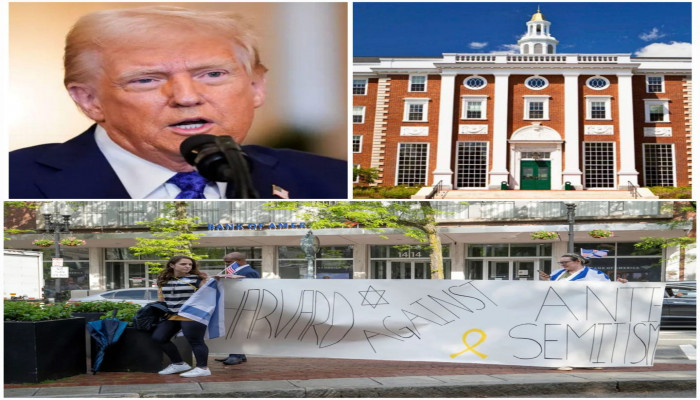Harvard faces $2.2 billion federal funding freeze for defying Trump's anti-Semitism compliance
- In Reports
- 12:45 PM, Apr 15, 2025
- Myind Staff
Harvard, one of the top universities in the U.S., faced a $2.2 billion freeze in federal funding on Monday after refusing to comply with a set of broad demands from the White House aimed at addressing anti-Semitism on campus. These demands included changes to how the university is run, hires staff and admits students. They build on an earlier list sent on April 3, which called for the closure of diversity offices and required the university to work with immigration authorities to screen international students.
In a letter addressed to students and faculty, Harvard president Alan Garber promised to stand firm against the government, making it clear that the university would not "negotiate over its independence or its constitutional rights."
In response, Trump’s Joint Task Force to Combat Anti-Semitism issued a statement revealing that $2.2 billion in multi-year grants would be put on hold, along with a freeze on $60 million in government contracts.
"Harvard's statement today reinforces the troubling entitlement mindset that is endemic in our nation's most prestigious universities and colleges -- that federal investment does not come with the responsibility to uphold civil rights laws," it stated. "The disruption of learning that has plagued campuses in recent years is unacceptable. The harassment of Jewish students is intolerable. It is time for elite universities to take the problem seriously and commit to meaningful change if they wish to continue receiving taxpayer support."
Last year, universities across the U.S. saw a wave of student protests opposing Israel's war in Gaza. Some of these demonstrations turned violent, leading to confrontations with police and pro-Israel counter-protesters. Donald Trump and other Republican figures have accused the protesters of backing Hamas, a group labelled a terrorist organisation by the U.S., whose deadly assault on Israel on October 7, 2023, triggered the ongoing conflict. In March, the Department of Education said it had launched an investigation into 60 colleges and universities over claims of "anti-Semitic harassment and discrimination."
Garber’s letter followed the administration’s move to review $9 billion in federal funding allocated to Harvard and its affiliates, along with initial demands. On Friday, the government sent a more extensive request, calling for an "audit" of student and faculty opinions, which Harvard later released publicly. In the previous financial year, Harvard reported an operating surplus of $45 million from a total revenue of $6.5 billion.
Garber stated that the university is "open to new information and different perspectives" but clarified that it won’t comply with demands that "go beyond the lawful authority of this or any administration." He emphasised that "no government -- regardless of which party is in power -- should dictate what private universities can teach, whom they can admit and hire, and which areas of study and inquiry they can pursue."
Meanwhile, prominent Republican congresswoman Elise Stefanik, praised by Trump last year for her tough stance on universities regarding anti-Semitism, called for Harvard to lose its funding. She described the institution as "the epitome of the moral and academic rot in higher education." Stefanik, a vocal advocate in Congress for Israel and Jewish causes in the U.S., accused Harvard of allowing "raging anti-Semitism" to persist on its campus.
Harvard’s reaction to the White House’s demands was noticeably different from how Columbia University responded. Columbia, which was at the centre of last year’s pro-Palestinian protests, faced a $400 million funding cut from the Trump administration. The government accused the university of not doing enough to protect Jewish students from harassment during demonstrations against Israel’s actions in Gaza.
In response, Columbia agreed to change how it handles student discipline and brought in 36 new officers to strengthen campus security. Alongside the funding cut, immigration authorities also took action against two protest organisers from Columbia. Mahmoud Khalil is facing deportation, and Mohsen Mahdawi was arrested on Monday while attending a citizenship interview.







Comments